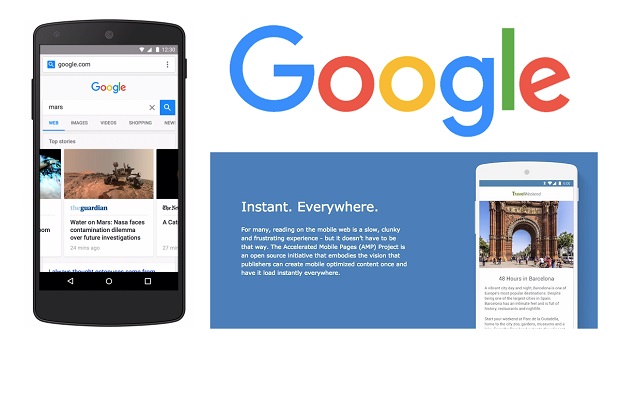Google’s Accelerated Mobile Pages is forecast to be the next big thing in digital marketing for 2016. We look at what marketers need to know about how the new technology that Google hopes will tackles the rise in ad blocking on mobiles.
Announced by Google last month, Accelerated Mobile Pages (AMP) greatly improves the search experience for those who are surfing the web from slower connections, who might be too slow to download a usual webpage full of heavy graphics and other media, or for those who are bandwidth restricted.
Under AMP, webpages with rich content like video, animations and graphics will work alongside smart ads, and to load instantaneously.
The same code will work across multiple platforms and devices so that content can appear everywhere in an instant—no matter what type of phone, tablet or mobile device used.
The project relies on AMP HTML, a new open framework built entirely out of existing web technologies, which allows websites to build light-weight webpages.
Crucially for advertisers and publishers, AMPs are specially formatted web pages that enable search to display this content extremely fast, while ensuring that publishers control the way their content looks and feels.
The project is partly a response to the launch of Facebook Instant Articles and Apple News, both of which let newspapers, magazines and digital media companies publish content directly to their platforms.
Google says anyone is free to cache web pages under the scheme, in theory allowing Facebook or Apple to provide AMP articles on their own platforms just as quickly as with Instant Articles or Apple News, but allowing publishers to retain more control over their content.
To see AMP in action, there is a demo here (view from a mobile device).

Tackling the ad blocking challenge
One of the aims of the project is to help set out the future of digital advertising, letting publishers run adverts that appeal to consumers rather than interrupting the user experience.
Speaking to Marketing Week, David Besbris, vice president of engineering for search at Google, said the project is still working on what sort of ads will and won’t be supported but pointed to a few “core tenets” that are important.
“We think advertising is a key and important part of the web experience as it is today but advertising needs to be better. Just like the rest of the content it needs to be fast, not obtrusive, easy to view.
“There are lots of parts of the ad ecosystem today where we’ll see pop-up ads, sticks ads – these are the kinds of things we’re working on to make sure they are not interfering with the user experience,” he explained.
Those slow speeds have been blamed for the rise of ad-blocking software, which stops many publishers from earning money from advertising online.
Danker added that the rise of ad blockers is a sign that digital publishing is not creating the experience that consumers want.
“This is an industry wide problem, if you take ad blockers for example. Readers are not spending hours discriminating between sites based on their speed, they punish each of us for the sins of the whole ecosystem.”
Back in September, Apple allowed third party apps to block ads in its Safari web browser, which is expected to massively increase the number of people deciding to block ads on iPhones and iPads.
Google has already got several big industry players on board, with comScore now supporting the AMP Project, and it is widely expected to be rolled out next year.
Many industry commentators expect it to be a major part of Google’s ad strategy going forward:
Google is pushing AMP aggressively next year. https://t.co/CbrxefLS4M and https://t.co/Egv4DtCNn3 for more info, @methode #StateofSearch
— Jennifer Slegg (@jenstar) November 16, 2015
The initial plan for AMP has come from the Digital News Initiative, a collaboration between Google and eight European publishers including the Guardian, Les Echos in France, El Pais in Spain and the Daily Mail in the US.
The shift away from desktops to mobile devices has left many publishers struggling to get their articles and other content on to people’s devices quickly.
If brands or publishers want to become a part of Google’s AMP Project, they can fill out the form here to get started.

